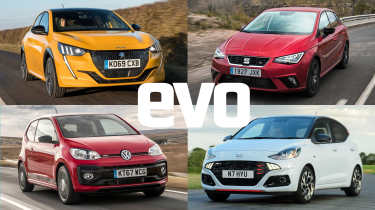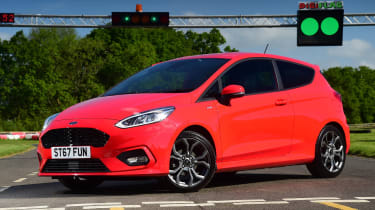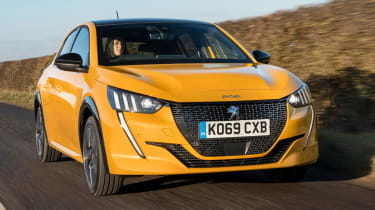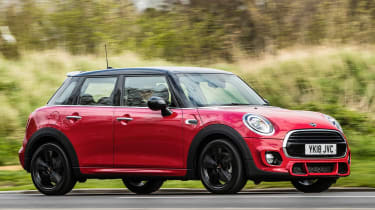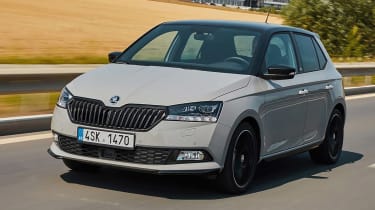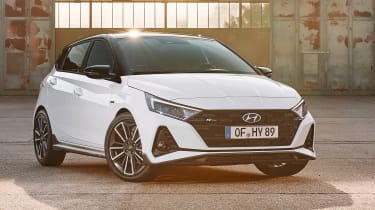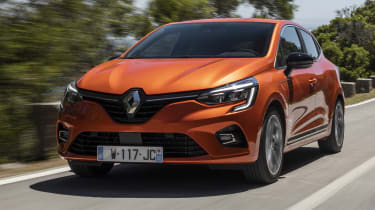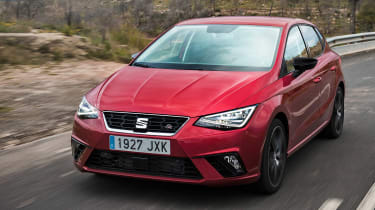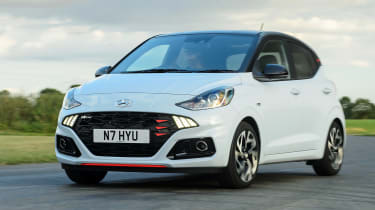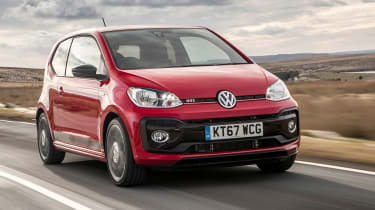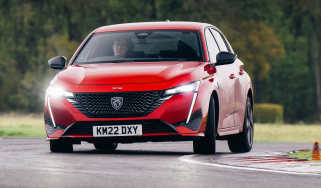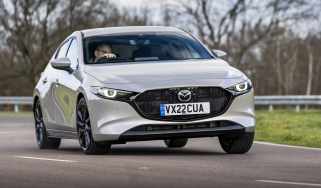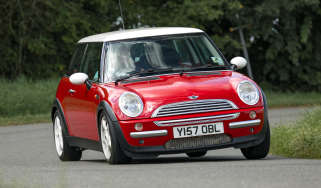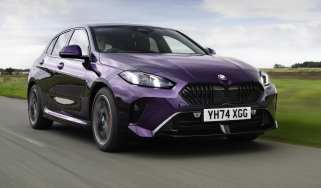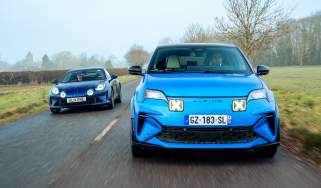Best small cars 2024 – pocket rockets reviewed and rated
You don’t need 200bhp or more in a small hatchback to have fun – these ‘warm’ small cars are the proof
A 130bhp power output used to be the norm for the hot supermini, but now you need at least 200bhp, an aggressive chassis and a set of sticky tyres to be taken seriously – as evidenced by cars such as the Ford Fiesta ST, Hyundai i20 N and the excellent Toyota GR Yaris.
Thankfully, those with lower budgets can still find entertainment in the supermini and city car classes without spending more than £20,000 and dropping below the 30mpg mark. Most of our best small cars, the models you’ll find listed below, should achieve mpg figures in the 40s in daily driving, shouldn’t cost the earth to run or insure, but will still put a smile on your face when the road opens up.
> Best hot hatchbacks 2024 – the best everyday performance cars you can buy
Best small cars on sale now
Ford Fiesta ST-Line
The latest Ford Fiesta, and by extension the sporty ST-Line, has carried on where the old model left off. That car provided sub-ST thrills with a surprisingly highly tuned three-cylinder engine and an agile chassis. If it had any faults, it was that the price wasn’t that far shy of the full ST’s at the time.
Though the latest ST still provides some of the greatest thrills for the money, you certainly won’t be disappointed with its warm sibling. In its most potent form power comes from a 1-litre turbocharged three-cylinder with hybrid assist, boasting 153bhp for a 9.2sec 0-62mph sprint.
Better than its straight-line performance is the chassis. There’s even more maturity to the new Fiesta so it’s probably not the best choice if you’re looking for a raw and rowdy experience, but it’s agile, delivers decent feedback through the controls, and takes the edge off poorly surfaced roads.
Peugeot 208 GT Line
Built on the same PSA-built platform you'll find in the new Vauxhall Corsa, the all-new Peugeot 208 is a marked step up from its predecessor. Buckets of technology, an all-electric variant and a fresh new design help it stand out in today’s crowded small car market.
Featuring the marque’s trademark ‘claw’ daytime running lights and bold, contrasting arches, the exterior design is something you’ll struggle to miss. A charming two-tone design and an aggressive front end make it one of the most attractive small cars on sale, and the design overhaul doesn't stop there. Inside, there’s a pleasingly compact steering wheel, a unique three-dimensional digital dashboard and reams of niceties such as USB-C front and rear, Apple CarPlay, heated seats and more should you opt for the GT Line.
> Peugeot 208 GT Line review – new generation supermini moves the game forward
Though a hot Peugeot Sport offering is off the cards, powertrain offerings are aplenty. At the bottom of the range is a 1.2-litre, 73bhp petrol available only with a six-speed manual, rising to the range-topping 127bhp variant with an eight-speed automatic – there’s also a 1.5-litre, 99bhp diesel available alongside the all-electric e208 with 134bhp.
Opt for the most powerful petrol and the 208 has plenty of go, though its sole eight-speed automatic gearbox offering won’t be for some – it’s good enough for everyday driving, but you’ll yearn for more response on a B-road blast. What remains a constant across the range is its chassis, boasting quick turn-in and limited body roll – outright grip isn’t a match for the Ford Fiesta’s, but the 208’s an entertaining machine to drive nonetheless.
Mini Cooper
The regular Mini Cooper has always been a sweet spot in the Mini range and the current model is no exception. It’s neither as fast nor as sharp as a Cooper S or John Cooper Works-badged model, but get the £18,005 Cooper on the right road and it still puts a grin on your face.
Part of this is down to the engine. While it hasn’t escaped the trend towards turbocharging, the 1.5-litre three-cylinder motor (also found in the back of BMW’s i8) is smooth, reasonably punchy (134bhp, and 162lb ft at 1250rpm) and willing to spin all the way to the red line.
> Mini Cooper review - retro supermini as polished as ever
And the softer set-up compared to hotter Minis means it really flows down the road, aided by the same responsive steering as any other Mini and nice balance to the chassis – all the more exploitable with lower levels of grip.
You certainly shouldn’t rule out the three-pot Cooper if you’re after an uncomplicated, fun driving experience, and despite the premium-esque badge the pricing undercuts Ford’s alternative.
Skoda Fabia Monte Carlo
The days of the hot Fabia vRS are long gone, but in Monte Carlo trim Skoda’s hatchback is still a worthy alternative to rivals from Ford and Hyundai. A design free of ostentation, strong powertrains and class-leading build quality make it an attractive choice.
The Fabia shares underpinnings, engines and transmissions with the current Volkswagen Polo. A selection of 1-litre three-cylinders are what you’ll find on the options list, comprising three turbocharged TSI units and one non-turbocharged unit, varying in output from the 59bhp entry-level engine to the range-topping 108bhp TSI. All are connected to manual gearboxes – five speeds for most and six for the top TSI – which are pleasingly slick. The middling 94bhp TSI is also available with a seven-speed DSG.
Performance is not the Fabia’s strong suit, but should you select one of the more powerful engines you won't struggle to keep up with traffic. Its ageing underpinnings make it feel more basic than its Volkswagen sibling, and it's certainly no match for the Ford Fiesta in terms of dynamic ability.
The Monte Carlo will nudge an eye-watering £25,000 should you tick enough boxes, but what makes the Fabia so appealing is its £14,645 starting price. This doesn’t come at the cost of build quality, either, with it leagues ahead of the Ford Fiesta and Renault Clio.
Hyundai i20 Ultimate
The i20 N has proven that Albert Biermann’s N division is far from a one-trick pony, with it offering true competition to the long-standing Fiesta ST. Though less of a driver’s machine, it’s a similar story with its ordinary i20 counterpart, with it transformed into a competitive offering in its latest iteration.
Exterior styling saw a complete switch up for this generation, with a sharp, aggressive front end paired with a unique lighting signature front and rear. The cabin receives a raft of new tech, a snappy, well-integrated infotainment system and a refined design – though plastic use is on the high side, build quality is strong.
> Hyundai i20 N 2021 review – hot supermini zeros in on the Ford Fiesta ST
The more pricey i20 N is where you’ll find the real driving thrills, but the i20 Ultimate provides plenty of performance for everyday driving. Pairing a 1-litre three-cylinder with a 48V mild-hybrid system, output sits at 99bhp and 127lb ft for the entire range. Intriguingly, the i20 is available with either a dual-clutch automatic or a manual with an electronic clutch. During our time with the latter, it proved to make everyday driving a smoother affair, though requests for more spritely acceleration occasionally confused the system.
Renault Clio RS Line
Launched in 2019, the fifth-generation Renault Clio brought substantial updates to every aspect of the supermini – design was given a refresh both inside and out, but most notable were the new powertrains. A feeble 89bhp 0.9-litre three-cylinder paired to either a CVT or six-speed manual is one option for the RS Line, but the 1.6-litre E-Tech is the powertrain we’d opt for, pairing a more potent combustion engine with two electric motors and a 1.2kWh battery. Unlike any other model in this list it allows for pure electric driving at low speeds, making it a frugal machine should you spend your time in cities.
Inside, build quality is above that of the likes of Ford’s Fiesta, and although the faux carbonfibre won’t be for some, design is tasteful too. The seats blend artificial leather with fabric and offer a surprising level of bolstering, and although there’s some cheap plastic to be found throughout, all touchpoints feel solid.
> Renault Megane RS 300 2021 review – less is more with this GTI rival
A 138bhp output puts it high on our list in terms of power, but its unusual ‘multi-mode’ clutchless gearbox makes for an equally unusual driving experience. Getting up to and maintaining speed is far from an issue, but the way the clutchless transmission delivers power can be a rather odd sensation, and not one that encourages a spirited drive.
The chassis is stronger than its powertrain, with the set-up in the RS Line confidence inspiring. Predictably, steering is light and without much feel, but well-tuned damping provides some feedback and its spring rate is perfect for a car of this kind, being tight enough to lessen roll but with enough slack to make it comfortable on Britain’s rough roads – it’s certainly no full-fat Renault Sport model, but it’s still well suited for a B-road.
SEAT Ibiza FR Sport
SEAT’s fifth-generation Ibiza arrived in summer 2017 and it’s not hard to see the appeal. The old model was easy enough on the eye, but the latest one takes the Leon’s styling and gives it an even sportier, tightly surfaced look. In sporty FR trim, it’s really quite appealing.
Underneath it’s not far removed from the Leon either, being based on a smaller version of the Volkswagen Group’s MQB platform – just like its VW Polo cousin. The subtext is that the new Leon feels like a car from the class above, and that’s both a good and a bad thing.
> SEAT Leon FR 1.5 TSI 2020 review – a spicy chorizo to a Golf’s currywurst
It’s good because the Ibiza FR is easier than ever to live with. It’s bad because the Ibiza was never the sharpest tool in the box before, and the extra maturity means it feels even less up for a bit of fun.
Don’t get us wrong, there’s a very competent chassis lurking underneath, but with only 1-litre three-cylinder power plants to choose from (with up to just 108bhp) it won’t break any records. It’s precise but lacks feel, it’s grippy but undramatic, and it’s agile but not that exciting. A good, sporty small car, but not really an evo one.
Hyundai i10 N Line
The i10 N Line is Hyundai’s answer to the highly successful Volkswagen Up GTI, bringing a dash of performance to a 1000kg supermini. Unlike its German rival, it boasts fresh bumpers front and rear to set it apart from the ordinary trim levels, and inside you’re treated to an eight-inch touchscreen, wireless charging, a reversing camera and more.
> Hyundai Ioniq 5 priced from £36,995
Power comes from the same 1-litre three-cylinder you’ll find in the entry-level i10 SE, but the addition of a turbocharger lifts output to 99bhp and 127lb ft of torque. This makes for a 10.5sec 0-62mph time and 115mph top speed – quite some way behind the Volkswagen.
Its skinny, eco-centric tyres lack grip, but with spring rate increased and new shock absorbers added, dynamics are more mature than you’d expect from a car of this kind. Its 1024kg weight figure also helps its cause, meaning there’s plenty of fun to be had given the right roads.
Volkswagen Up GTI
Perhaps the best car on this list, the 113bhp Volkswagen Up GTI is a rather charming machine. With its 8.8sec 0-62mph time it might not be mind-bendingly quick, but look beyond the six-stone weakling statistics and you’ll find a genuinely engaging pocket rocket.
Part of the VW's appeal is down to a couple of key features. The first is the Up GTI’s sub-ton kerb weight. Tipping the scales at just 995kg, the engine’s modest power suddenly looks more than sufficient, while its featherweight body also suggests the Up will be more than fun enough when presented with a corner or two. In reality, both are true; the Up GTI is brisk, even if it isn’t truly fast, and it’s eager, tenacious and eminently chuckable on a tight British B-road.
> VW Up GTI review – VW’s smallest GTI tested on UK roads
The other exciting number is the Up GTI’s price. Though it has seen a substantial uplift since its launch, at £16,390 it doesn’t matter that it’s not the most agile car or that there are limitations to its suspension, because the torquey engine, quality interior, super-fast gear change, perfectly resolved looks and fun-loving driving experience mean that it feels like a true performance car bargain.
evo best small cars 2021
- Ford Fiesta ST-Line
- Peugeot 208 GT Line
- Mini Cooper
- Skoda Fabia Monte Carlo
- Hyundai i20 Ultimate
- Renault Clio RS Line
- Seat Ibiza FR Sport
- Hyundai i10 N Line
- Volkswagen Up GTI
